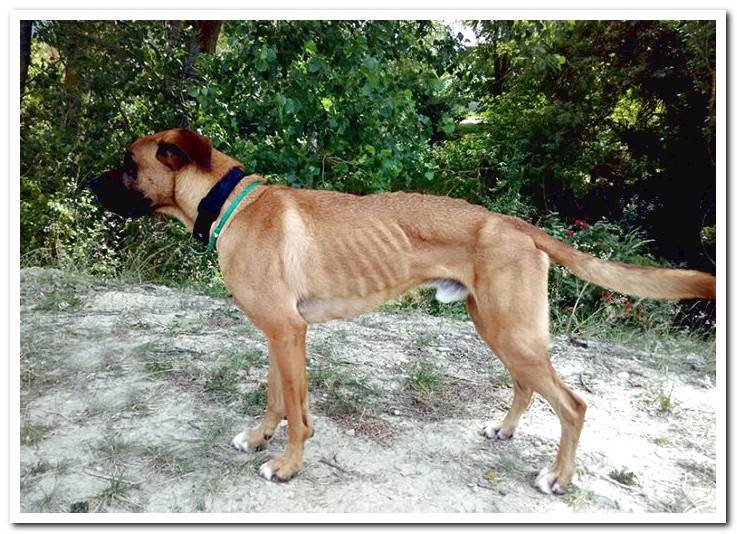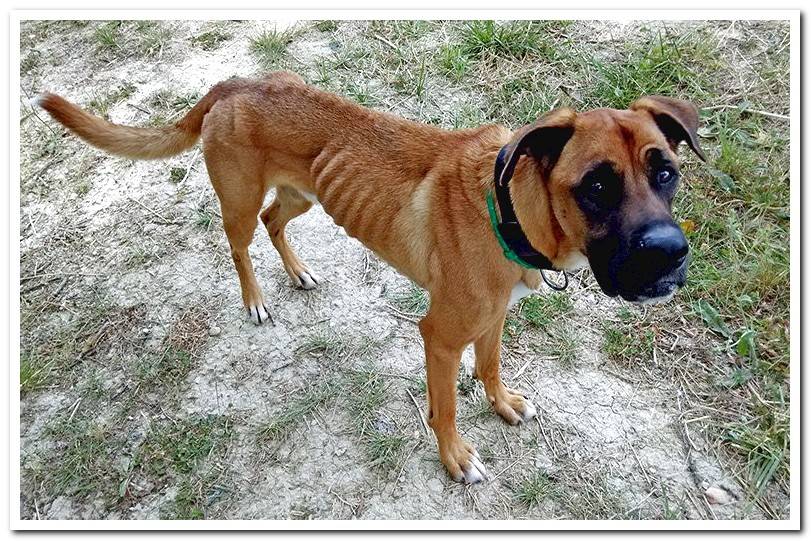
Dogs like greyhounds are slim, so it is really difficult for us to see them as overweight. But, if our dog is not of this type of breeds, that he eats but does not gain weight is cause for concern.
It may simply be due to a mismatch between the amount of energy you get with food and the amount you spend. But, other times, eating and not gaining weight is a sign of serious illnesses that can seriously harm your health. Let’s see in detail which are the main ones.
- You may also like: What is the best dog food?
Index of contents
- 1 Dog feeding
- 2 Dog physical activity
- 3 Intestinal parasites, causing thinness
- 4 When the food does not reach the stomach
- 5 When the food feels bad
- 6 The stomach is damaged, another probable cause
- 7 Other common illnesses
Dog feeding
If we observe that our dog eats but does not gain weight, the first thing we should pay attention to is its diet. A newly weaned puppy cannot eat the same as a sedentary adult dog or an elderly one. Therefore, a dog will not eat the same food throughout its life.
Each stage is characterized by different nutritional needs. That is why we must adapt the diet to the vital moment of our dog. If we choose to offer you industrial food such as feed, cans of wet food or dehydrated menu, we will find a wide variety for sale. If we have doubts about which one to choose, we should consult the vet.
In addition, we must start by always offering you the amount indicated by the manufacturer:
- Recommended amount of food for a dog
Depending on whether the dog is fattening or losing weight we can modify the ration. If we choose to give you homemade food, it is essential that we contact a veterinaryn specialized in nutrition to ensure that the menu is correct.

Dog physical activity
Choosing a quality diet adapted to the quantity that the dog needs to meet its needs should not have weight problems. If these occur it is time for us to look at the activity that the dog develops.
With the current pace of life, most often we find dogs with overweight or directly, obesity, a consequence of excessive sedentary lifestyle. But the opposite could be the case. If the dog exercises a lot, it may not get the dose of food that would correspond to it by age and weight.
They are dogs that participate in hunting days or competitions such as agility. If this is our case, we must rethink the menu and not just increase the quantity. Some brands of dog food make special products for specimens with high energy consumption.
Intestinal parasites, causing thinness
First of all we highlight intestinal parasites as one of the reasons why a dog can find it fat even eating normally. This type of worms feed on the dog, hence the decrease in its physical state derives. This problem is more frequent in puppies or in adults weakened by some other cause.
- All about intestinal parasites in dogs
We can see that they are thin and that they have a swollen abdomen. Vomiting and diarrhea or decomposition may also occur. The most serious infestations are cause of anemia. To avoid this problem, it is essential to deworm the dog regularly, as prescribed by the vet.
When the food does not reach the stomach
The esophagus is the tube that carries the food bolus that the dog swallows down to its stomach. In the disorder known as megaesophagus, this tube enlarges and, instead of transporting food, accumulates it. The dog eats, in fact it goes to the feeder with total normality.
But in reality, although it may go unnoticed, it regurgitates and returns to ingest what it has expelled. Puppies can suffer from congenital megaesophagus. These little ones will look malnourished and stunted. It is essential to go to the vet. In some cases, surgery can be performed.
When the food feels bad
Sometimes dogs eat normally but lose weight because some cause is irritating the stomach. This is what happens in chronic gastritis. Dogs can show vomiting as a symptom. But, since they appear sporadically, they can go unnoticed.
This gastritis originates as a consequence of food allergies, continued ingestion of irritating products such as grass or papers, hairballs, foreign bodies, etc. Thus, even if we do not notice any symptoms, if we find that the dog loses weight, it must be taken to the vet.
The stomach is damaged, another probable cause
A gastroduodenal ulcer causes injury to the digestive tract. It is the cause of sporadic vomiting that, due to its frequency, may seem unimportant to us, unless it contains blood. The dog will eat but will lose weight and will be anemic. Ulcers often occur in dogs that are taking corticosteroids.
More common than ulcers are the so-called inflammatory bowel diseases. In these cases the dog eats, but loses weight and presents other symptoms such as chronic diarrhea, anemia and malnutrition.
There is a malabsorption This means that even if the dog eats, even voraciously, it cannot absorb all the nutrients it needs or is unable to digest the food. In any case, you have to go to the vet and feed him a specific diet.

Other common illnesses
Not only can digestive disorders be behind a dog eating, even more than normal, but it doesn’t put on weight. Different systemic diseases can affect the whole organism and weight loss is one of its symptoms. You have to go to the vet.
We highlight the following:
- Exocrine pancreatic insufficiency: the pancreas aids digestion. If it doesn’t work properly, the nutrients the dog ingests with food cannot be absorbed. There are different causes. It is normal for the dog to eat voraciously, although it does lose weight. You will also have diarrhea. It is usually treated with diet and supplements.
- Diabetes: Insufficient insulin production occurs in this condition. Since its function is to make glucose enter the cells, without it it accumulates in the blood. It is hyperglycemia. The dog’s appetite is increased at the beginning of the disease, but it loses weight. He also drinks and urinates more. It is treated with diet and injecting insulin.
- Dilated cardiomyopathy: It is a disease that pr
oduces a dilation in the heart, affecting its functioning. The dog loses weight quickly, is tired and coughs. The treatment tries to maintain the work of the heart and control the symptoms. - Filariasis: This disease is caused by worms that lodge in the heart. It is transmitted by a mosquito. The clinical signs depend on the severity of the infestation. The dog tires, coughs, loses weight and breathes heavily. The treatment is very delicate, it is prescribed depending on each case. Efforts are focused on preventing contagion by repelling the mosquito.
- Renal insufficiency: It is due to a chronic kidney failure. Sick dogs drink and urinate more, their coat looks bad, they may vomit and, in some cases, stop eating. It is treated with diet and the appropriate drugs according to the symptoms that appear.
- Cancer: Cancer is more common in older dogs. Many are appreciable tumors such as lumps. But, when they develop inside the body, the symptoms are nonspecific, such as weight loss, vomiting, diarrhea or constipation. It is recommended to go to an annual veterinary review to detect them early.
